|
When does the emotional storm of feeling begin? At birth as the child emerges from the warm hatchery of the womb?
Through books she has been reading this summer, the Steiny Road Poet has been thinking about how one's childhood connects to feeling.
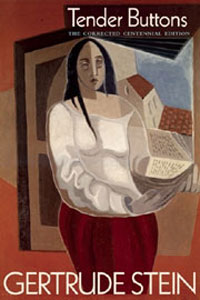
In Steiny's interpretation, Gertrude Stein's Tender Buttons opens with a child (kind is child in German) and a cousin (cousin can be defined as "a
thing related or analogous to another"). Could cousin possibly refer to Gertrude's brother Leo? Both—kind-child and cousin-brother—emerge
from the vessel of a carafe that is a blind glass, where blind glass could be the amniotic sac. The birth is a spectacle that produces a hurt color—blood
perhaps. Here is the first Tender Buttons object:
A CARAFE, THAT IS A BLIND GLASS.
A kind in glass and a cousin, a spectacle and nothing strange a single hurt
color and an arrangement in a system to pointing. All this and not ordinary, not unordered in not resembling. The difference is spreading.
The backstory is that Gertrude and her brother Leo were replacement children because their parents buried offspring number four and number
five. Stein was a Modernist (and a scientist who was taught to deal in facts and proof) and to be wary of the sentimentality of the 19th century. So her
tender feelings are under wraps, especially since this book was meant to be a wedding gift to her partner (clandestine wife) Alice Toklas.
Uncharacteristically, Steiny, who is not a fan of 19th century poetry, has been reading Elizabeth Barrett Browning's book-length poem Aurora
Leigh (published 1856). In this epic poem filled with obscure classical and literary allusions that frankly produce glassy-eyed irritation, Steiny has also
experienced a depth of feeling for the protagonist who we see as a child losing first her Italian mother and then her English father, followed by her
sea-tossed delivery to a paternal aunt who doesn't love her and imposes all sorts of limitations. The aunt expects Aurora to marry Cousin Romney, to
serve him as an obedient wife, and to preserve the Leigh estate, the legacy of Aurora's father and uncle—father of Romney. Aurora says no thank you.
She plans to live an independent life as a poet. This is what has drawn Steiny to Aurora Leigh.
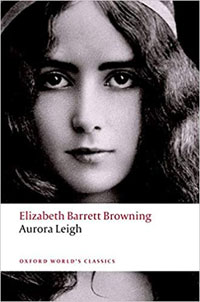
What evolves from the refusal of marriage is that an aristocratic woman, Lady Waldemar, pursues Romney who, as a social do-gooder, has already
asked a working class girl, Marian Erle, to marry him. Romney sees this marriage in keeping with his social philosophy in that Marian will be better
off—elevated to a social class with more economic privilege, and she will serve him well in realizing his betterment of the socially disadvantaged.
Lady Waldemar petitions Aurora to stop the marriage. After many plots twists that include the rape of Marian (Lady Waldemar's fault), Aurora,
who has invited Marian and Marian's child to live with her, realizes that she loves her cousin.
Barrett Browning who was clearly drawing on her own life—growing up
she was an invalid suffering many limitations, but she managed to rally, to live a poet's life, marry, and have a child. Barrett Browning exercised
admirable skill in showing the depth of feeling in all her characters. For example, the reader feels her aunt's disgust upon learning her ward has not accepted Romney's proposal.
Why, you child,
God help you, you are groping in the dark,
For all this sunlight. You suppose, perhaps,
That you, sole offspring of an opulent man,
Are rich and free to choose a way to walk?
You think, and it's a reasonable thought,
That I, beside, being well to do in life,
Will leave my handful in my niece's hand
When death shall paralyse these fingers? Pray,
Pray, child, albeit I know you love me not,
As if you loved me, that I may not die!
For when I die and leave you, out you go
(Unless I make room for you in my grave),
Unhoused, unfed, my dear, poor brother's lamb
(Ah heaven—that pains!)—without a right to crop
A single blade of grass beneath these trees,
Or cast a lamb's small shadow on the lawn,
Unfed, unfolded! Ah, my brother, here's
The fruit you planted in your foreign loves—
Ah, there's the fruit he planted! Never look
Astonished at me with your mother's eyes,
For it was they who set you where you are,
An undowered orphan.
The line about making room for Aurora in the aunt's grave is absolutely chilling in its indifference, but clearly meant to frighten the young woman.
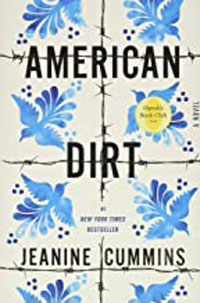
In American Dirt by Jeanine Cummins, the reader, from the first page, is
thrust into a mother's terrifying fight to preserve her child's life as well as her own. Accidentally, the mother who is from a well-to-do family gets
mixed up with the ruthless head of a Mexican cartel. At a family backyard gathering, cartel assassins murder the woman's husband, mother and other
family members—sixteen in all. By chance, she and her young son escape notice as she has escorted the boy to the bathroom. For Steiny, the most
terrifying scene occurs when mother and son try their luck in dropping down from a bridge atop La Bestia, the train that will carry them north to
the United States where they can escape the cartel. Steiny had to read this book in slow spurts because the emotional lode was so heavy and alarming.

The five Patrick Melrose novels of Edward St. Aubyn present a rollercoaster of emotions as the reader meets in Nevermind a young boy
who is sexually and psychologically abused by his father. Patrick's mother (and wife of Patrick's abuser) considers her son the result of a rape.
Constantly humiliated by her husband, the mother does not protect the son. Novels two through five travel through Patrick's disgusting drug addiction (Bad News) as he deals reluctantly with his father's death, his social life as
he emerges from addiction and makes something of himself (Some Hope), his marriage that produces two precocious sons (Mother's Milk), and finally in At Last how he deals with…or doesn't, his mother who is also an
abuser in her own way. As repugnant as most of these novels are, what kept Steiny reading was the skillful writing of St. Aubyn and the desire to see how this abused boy turns out.
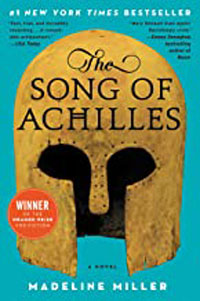
Madeline Miller's two novels The Song of Achilles and Circe based on
characters from Greek mythology both start in childhood. Both are compelling portraits through which Steiny developed emotional
attachments, making her wish the stories of Achilles and Circe would not end. The Achilles story portrays how the great warrior, golden boy and only
son of sea goddess Thetis and King Peleus, comes to love his childhood companion Patroclus. It's a story of same sex love that is tender and
convincing. What Achilles and Patroclus learn from an extended stay and training period with Centaur Chiron is exceptionally moving.
In contrast to Miller's portrayal of Achilles, Circe, one of many children of
the sun god Helios, is a neglected child. Her first moment of deeply felt emotion happens when she steals away to talk and give comfort to her
uncle Prometheus who has been whipped by a Fury. Zeus is punishing him for giving fire to humans. After his whipping, Zeus binds him to a mountain
rock so that the chief god's eagle can repetitively eat Prometheus' liver which grows back every night. The ancient Greeks believed the liver was
the seat of emotions. Before Prometheus is taken away to the mountaintop, Circe brings her uncle nectar and ask him about the true nature of human
beings. He tells her that humans are all different but that all of them, unlike gods, die.
Circe's story is much more complicated than that of Achilles'. In Miller's
feminist retelling of the Circe myth, Circe falls in love with Odysseus and they have one son (not three and Odysseus does not know anything about
this son's existence). The childhood of Telegonus is every bit as compelling as Circe's story but completely different since he is beloved by his mother
(and he is a monstrously difficult child) and he is a mortal doomed to die eventually.
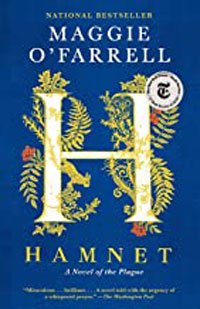
Steiny's saga of readings threaded together by childhood stories that press on the emotional nerve concludes with Maggie O'Farrell's Hamnet. What a
tear jerker. Like Madeline Miller, O'Farrell has embellished her story but with good reason—so little is known about William Shakespeare and his
family. In fact, O'Farrell discovered in her research that Shakespeare's wife was named in her father's will as Agnes and not Anne Hathaway as most
people call her. O'Farrell's novel goes back and forth between the story of Agnes and her son Hamnet. So we get the childhoods of both. Hamnet dies
at age 11 and the way O'Farrell tells his story is that he wills death to take him and not his frailer twin sister Judith who has been attended day and
night by their mother who is both a healer and a seer. The twist is that while the mother falls asleep at the bedside of Judith, Hamnet crawls into
the bed with his sister who has been stricken by the Black Plague. Judith survives, Hamnet dies. Agnes never saw this coming. Shakespeare, who is
never named in the novel, has been notified by a letter passed from traveler to traveler that Judith is dying. His theater friends get him a horse
and send him back to Stratford-upon-Avon, an arduous several day trip, arriving only to see his son sewn into a winding sheet.
Seen through the lens of childhood, all of these books pack an emotional wallop of different kinds—grief: Hamnet, heartbreak: Circe, forbidden
love: The Song of Achilles, incredulity: the Patrick Melrose novels, terror: American Dirt, indifference and its opposite: Aurora Leigh, extreme restraint: Tender Buttons. The consistent state of being through childhood
is vulnerability which opens up so many different kinds of emotion as Steiny has experienced in reading this set of recommended books.
|